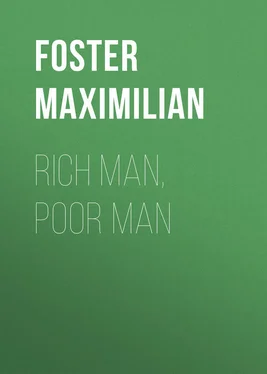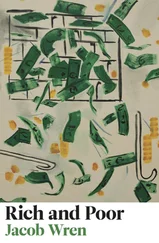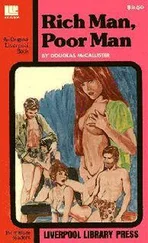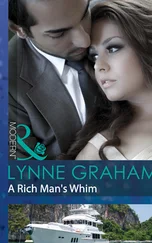Maximilian Foster - Rich Man, Poor Man
Здесь есть возможность читать онлайн «Maximilian Foster - Rich Man, Poor Man» — ознакомительный отрывок электронной книги совершенно бесплатно, а после прочтения отрывка купить полную версию. В некоторых случаях можно слушать аудио, скачать через торрент в формате fb2 и присутствует краткое содержание. Жанр: foreign_antique, foreign_prose, на английском языке. Описание произведения, (предисловие) а так же отзывы посетителей доступны на портале библиотеки ЛибКат.
- Название:Rich Man, Poor Man
- Автор:
- Жанр:
- Год:неизвестен
- ISBN:нет данных
- Рейтинг книги:5 / 5. Голосов: 1
-
Избранное:Добавить в избранное
- Отзывы:
-
Ваша оценка:
- 100
- 1
- 2
- 3
- 4
- 5
Rich Man, Poor Man: краткое содержание, описание и аннотация
Предлагаем к чтению аннотацию, описание, краткое содержание или предисловие (зависит от того, что написал сам автор книги «Rich Man, Poor Man»). Если вы не нашли необходимую информацию о книге — напишите в комментариях, мы постараемся отыскать её.
Rich Man, Poor Man — читать онлайн ознакомительный отрывок
Ниже представлен текст книги, разбитый по страницам. Система сохранения места последней прочитанной страницы, позволяет с удобством читать онлайн бесплатно книгу «Rich Man, Poor Man», без необходимости каждый раз заново искать на чём Вы остановились. Поставьте закладку, и сможете в любой момент перейти на страницу, на которой закончили чтение.
Интервал:
Закладка:
Varick had not caught the reply; for, after a startled exclamation, Mr. Mapleson had dropped his voice to a whisper. But Varick had heard enough. What, indeed, was Mr. Mapleson up to?
Bab's eyes grew vague. Then she laughed. The laugh, though, was a little strained, a little less free than usual. Then her eyes fell and a faint tide of color crept up into her face and neck.
"Honest Injun now," she again laughed awkwardly, "don't you know what's happening?"
Varick shook his head, and Bab, her eyes on his, bit her lip reflectively. That question she longed to ask him hovered on her lips now, and with it there had come into her face an air of wistfulness. Her blue eyes clouded faintly.
"Tell me," she said, and hesitated – "tell me something. If at the dance tonight – the dance you're going to – if – if things were changed; and I – you – "
Varick nodded quietly.
"Yes," he prompted, "if I – "
"If I were there," said Bab; "if things were changed and I – "
Again she paused. Her eyes, too, fell suddenly. Then she caught her lip between her teeth.
"Yes, Bab," encouraged Varick; "if what were changed?"
But Bab did not reply. Of a sudden, as she raised her eyes to his, a great wave of color rushed into her face, mantling her to the eyes. Of a sudden, too, the eyes fell, dropping before his look. Her confusion was furious and with an abrupt movement, swift and unexpected to him, she slipped from her chair and darted into the half-lit hall. Then the next instant she was gone, and Varick, his own face a study, stood gazing after her dumbfounded.
"Good Lord!" he murmured to himself.
For he was no fool, neither was he a coxcomb; and what Bab had let him read in her face had been a revelation.
III
Meanwhile, her cheeks aflame, furiously self-conscious at what she had revealed, Barbara Wynne had gone flying up the stairway to her room. There, half an hour later, tapping softly at her door, Mr. Mapleson found her lying in the dark, her face buried among the pillows of her bed.
"Why, Babbie!" he whispered – "Babbie Wynne!"
The boarders at Mrs. Tilney's, and especially those who had heard the story of Barbara Wynne, often commented on Mr. Mapleson's devotion to the landlady's little ward. The fact is the two had long lived together in the boarding house; for the year that Mr. Mapleson came to Mrs. Tilney's was the year Barbara Wynne had come there too. However, that was but a coincidence. They were in no way related. Mr. Mapleson, it seemed, had come first.
That night, now nearly seventeen years ago, nine o'clock had just struck when Mrs. Tilney's doorbell sounded. As the day happened to be a Sunday, and therefore the upstairs girl's evening out, Mrs. Tilney herself had answered.
The night was withering. It was the evening of an August dog day, ghastly betwixt the horrors of its heat and its stagnant, glaring sunshine, yet the man she found in the vestibule was clad in a winter suit not only sizes too large for him but suffocating in its armorlike thickness. Dust powdered him from head to foot. It powdered also the cheap suitcase he had set down beside him.
"Well?" Mrs. Tilney had inquired sharply.
A perfect convulsion of embarrassment had for a moment kept the slight, pallid man from replying. "I – why, your sign outside," he'd faltered then; "if you could let me have a room."
"You have references?" Mrs. Tilney had demanded.
The little man shook his head. Mrs. Tilney was about to shut the door when abruptly he threw out both his hands. The gesture was as timid as a girl's.
"I am from the country," he appealed. "I've come a great ways. I am very tired."
Then he smiled up at her, and somehow, in the wan wistfulness of his look, the sharp, distrustful woman had been placated.
"Oh, well," she grumbled and, standing aside, she waved for him to enter.
It had taken Mrs. Tilney weeks, not to say months, to grasp the real nature of her queer, retiring guest. Summer went, the autumn drew on. A new flock of winter "steadies" replaced summer's birds of passage and she wondered when he, too, would be gone. But Mr. Mapleson showed no disposition to depart. There were, in fact, signs that he meant to remain indefinitely. At any rate, on entering his room one morning Mrs. Tilney found upon the wall three cheap little color prints, each neatly framed in fumed oak. Also in a cigar box and tomato can on the window sill Mr. Mapleson had laid out for himself the beginnings of a window garden. A geranium and a Chinese bulb composed the horticultural display.
However, it was not until Thanksgiving Day, some weeks later, that Mrs. Tilney's suspicions of her guest were effectively set at rest. The circumstance arose over the departure, somewhat abrupt, of one of the other boarders, a Mr. Agramonte. The gentleman, the manager of a vaudeville booking agency, having let his board bill run three weeks, decamped secretly in the middle of the night. This was the day before Thanksgiving. At noon then, the fête day in question, Mr. Mapleson appeared suddenly at Mrs. Tilney's kitchen door. In his arms he bore a small potted plant. The plant was in full bloom and Mr. Mapleson was beaming shyly.
"I have brought you a flower," he said.
"Me?" had gasped Mrs. Tilney.
"Yes, it's a begonia," Mr. Mapleson was saying, when to his wonder, his alarm as well, Mrs. Tilney emitted a laugh, or rather it was a croak, then burst abruptly into tears, the first in years.
Never, never before, as she protested, had one of her boarders shown her such consideration. At the thought Mrs. Tilney wept anew.
However, to proceed: It was exactly one month after this that Barbara Wynne, the ward of Mrs. Tilney, had come there to the boarding house. The day, like the day of Mr. Mapleson's advent, was one to be remembered. A raw wind from the eastward had risen with the morning, and well on in the afternoon rain began. Presently, as if to show what a December storm really can do in New York, it settled itself into a soaking downpour – a flood that changed before long to cutting sleet, then to a wet, clinging snow.
Toward night Mrs. Tilney's upstairs girl entered the kitchen where Mrs. Tilney waged diurnal warfare with her cook.
"There's a lady in the parlor, mum," she announced.
The term was too often vulgarly misused in Mrs. Tilney's cosmos to excite anticipation.
"A lady? How do you know?" demanded Mrs. Tilney.
"Sure, mum," replied the girl with convincing frankness, "she do look different f'm yer boarders!"
It proved, moreover, to be the truth. Upstairs in the parlor Mrs. Tilney found a slender, wan-faced woman to whose dripping skirts clung an equally rain-soaked child; and that they were persons of distinction not even their appearance could dispute. The visitor's voice, when she spoke, was low and modulated. It rang like the undertone of a bell.
"I am looking for rooms – a room," she corrected.
A shudder accompanied the words, and with a gesture of uncontrollable languor she held her hands to the coal glowing in the hearth.
The landlady debated. Transients of this sort were as little to her liking as they were rare. However, after some misgivings she showed her visitor the one vacancy. It was a top-floor bedroom just down the hall from Mr. Mapleson's. Board included, the rent would be sixteen dollars.
"Thanks," said the visitor. "I'll have my trunk sent in at once."
Her tone Mrs. Tilney had thought hasty, over-eager. Before the landlady, however, could utter that shibboleth of her calling, "You have references?" the child spoke. Clinging to her mother's skirts, she had been staring at Mrs. Tilney.
"Babbie Wynne's hungry," she said.
With a start and a swift contraction of her mouth the mother leaned down to her.
Читать дальшеИнтервал:
Закладка:
Похожие книги на «Rich Man, Poor Man»
Представляем Вашему вниманию похожие книги на «Rich Man, Poor Man» списком для выбора. Мы отобрали схожую по названию и смыслу литературу в надежде предоставить читателям больше вариантов отыскать новые, интересные, ещё непрочитанные произведения.
Обсуждение, отзывы о книге «Rich Man, Poor Man» и просто собственные мнения читателей. Оставьте ваши комментарии, напишите, что Вы думаете о произведении, его смысле или главных героях. Укажите что конкретно понравилось, а что нет, и почему Вы так считаете.












